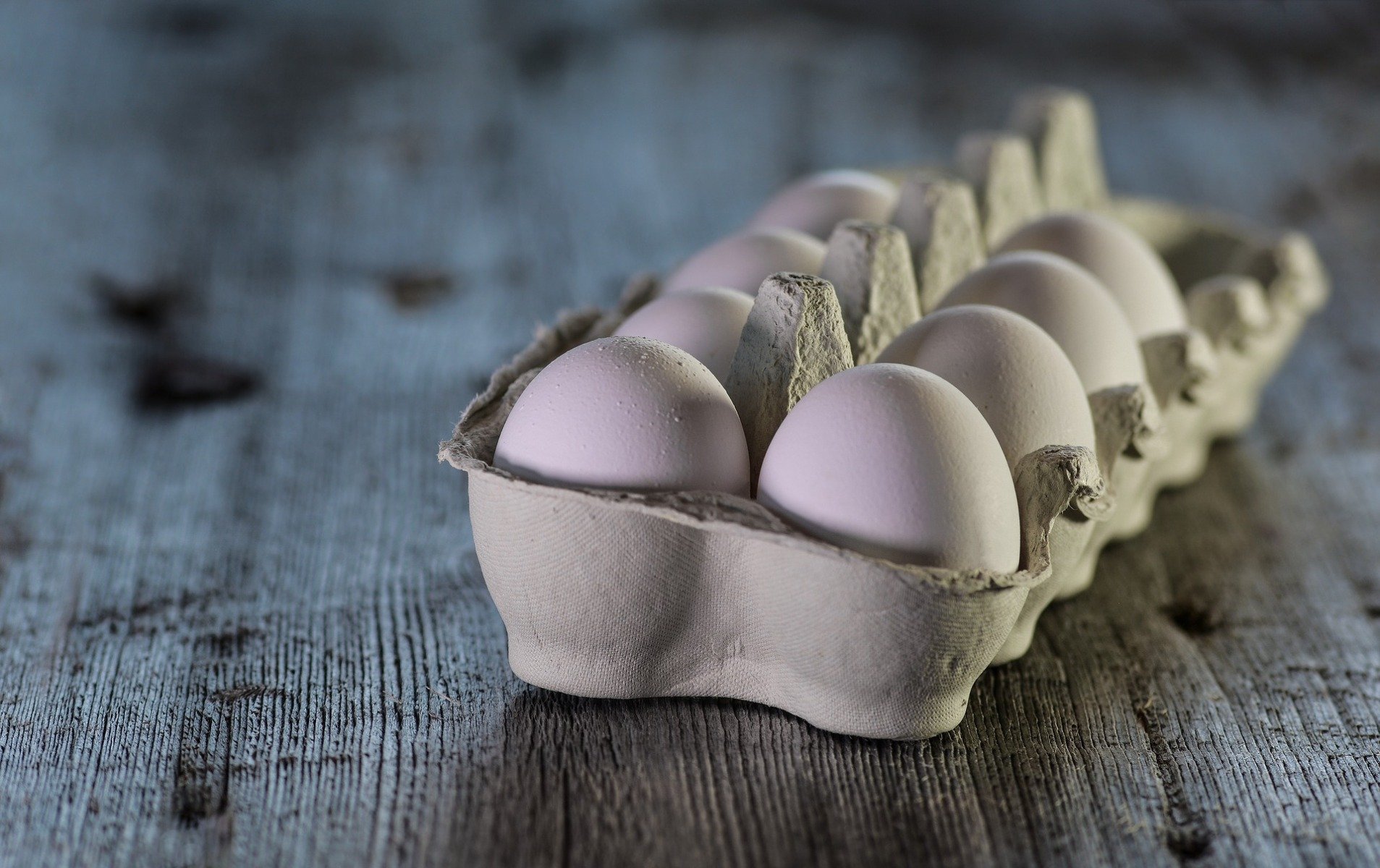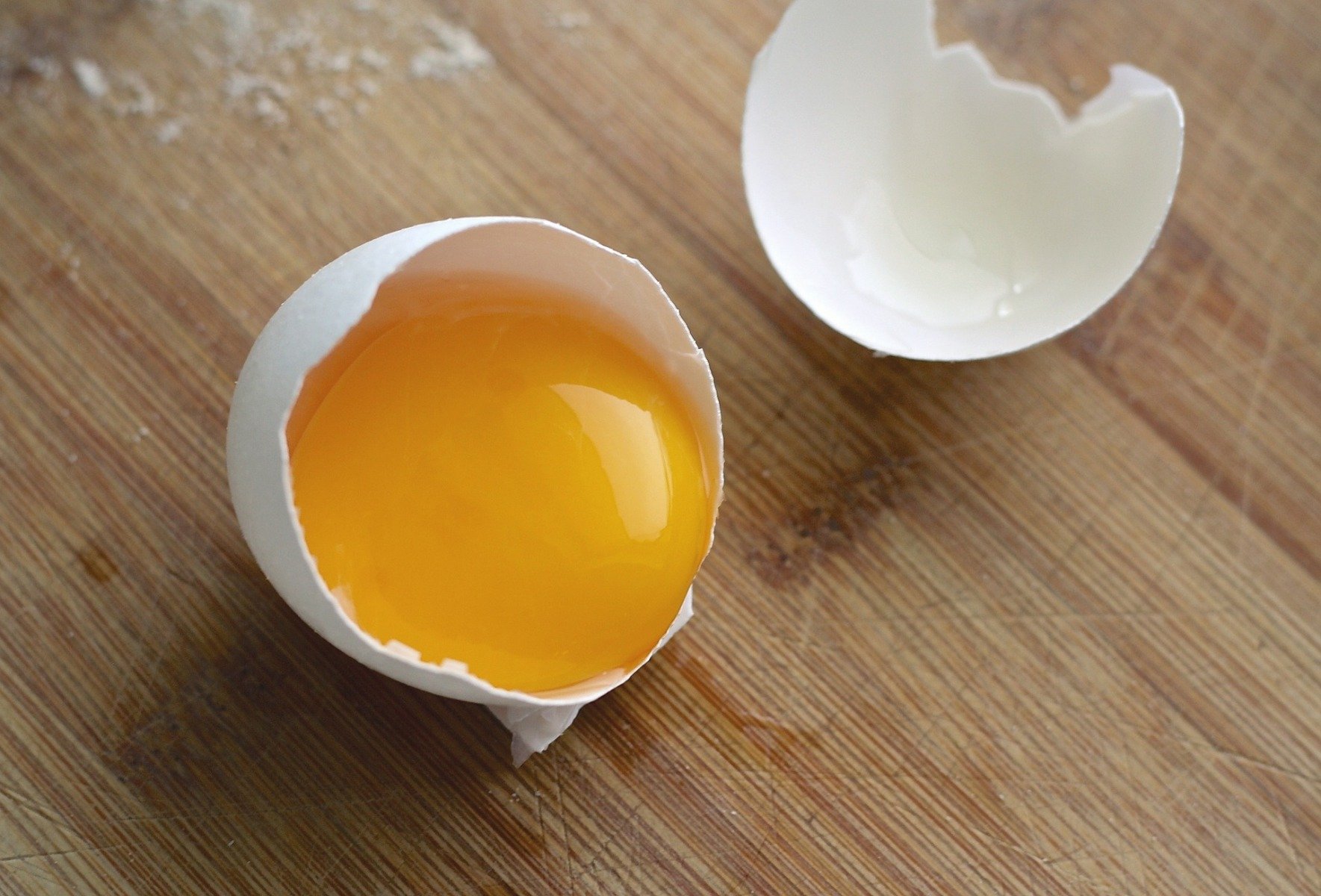Table of Contents
For many of us, eggs are an essential part of our diet, especially our breakfast. Can you imagine that you stop consuming them from day to day? Fortunately, you don’t have to do that. Eggs are among the most affordable sources of nutrients and there is a wide variety of ways to prepare them. However, the question of egg consumption is their cholesterol content. Therefore, we decided to write an article to help you understand the issue.
Eggs as a source of nutrients
Eggs are an excellent source of protein and other important nutrients. Under the fragile egg shell, you will find its two basic parts – yolk and egg white. The yolk is the yellow-orange sac-shaped part of the egg whose main task is to nourish the fetus. The egg white is a liquid colorless egg yolk cover that forms its protective layer. Some of the nutrients are found in both components, others are found only in egg yolks or only in egg whites. [1] For comparison of nutrients, see a table containing macronutrients, minerals and vitamins [7]:

| Protein | 3,6 g | 2,7 g | 57 % | 43 % |
| Fats | 0,05 g | 4,5 g | 1 % | 99 % |
| Calcium | 2,3 mg | 21,9 mg | 9,5 % | 90,5 % |
| Magnesium | 3,6 mg | 0,85 mg | 80,8 % | 19,2 % |
| Phosphorus | 5 mg | 66,3 mg | 7 % | 93 % |
| Potassium | 53,8 mg | 18,5 mg | 74,4 % | 25,5 % |
| Sodium | 54,8 mg | 8,2 mg | 87 % | 13 % |
| Vitamin B2 | 0,145 mg | 0,09 mg | 61,7 % | 48,3 % |
| Vitamin B3 | 0,035 mg | 0,004 mg | 89,7 % | 9,3 % |
| Vitamín B5 | 0,63 mg | 0,51 mg | 11 % | 89 % |
| Vitamin E | 0 mg | 0,684 mg | 0 % | 100 % |
You might be interested in these products:
Egg white
Egg whiteconsists of 90 % of water and almost 10 % of protein. It also contains trace amounts of fat and vitamins. A key component of egg white is proteins that contain all 9 essential amino acids. The best known of the proteins is albumin, the advantages of which are a high proportion of amino acids and a suitability for people with lactose intolerance. In addition, albumin is also characterized by its sulfur content, which is crucial in the production of hormones in the human body. The egg white also contains protein called avidin, which binds certain B-group vitamins and thus prevents their absorption. Avidin can be eliminated by heat treatment which reduces the loss of nutrients. [2] [4] [5] [15]

Egg yolk
Egg yolk consists of 46% oleic acid, 38% are saturated fats and 16% polyunsaturated fats. The ratio of polyunsaturated fats depends on the way in which the hens are bred. The hen’s diet is mostly made up of grains with a high content of omega-6 fatty acids, so most eggs in supermarkets have a higher content of omega-6. Free-range hens or hens with an omega-3 rich diet have a much more balanced polyunsaturated fatty acid ratio. If you’re interested in the importance and difference between praticular fatty acids, read our article Omega-3 fatty acids: do you consume enough and in the right proportions to omega-6?
Egg yolk contains high levels of carotenoids and amino acids and is also one of the richest sources of choline. Choline breaks down the fatty tissue of the liver and, in addition, is converted into the important neurotransmitter acetylcholine in the body. [2] [6]
Nutrients in the egg yolk are beneficial for the body and their most important influence is in the following areas [8]:
- reduce the risk of digestive problems – the yolk contains a protein called fosvitin, which eliminates the number of inflammatory substances.
- improve the immune system – glycopeptides in the yolks improve the production of macrophages that take care of protecting the body from infections.
- lower blood pressure – peptides in the yolks can affect blood pressure and thus prevent cardiovascular diseases.
- reduce the risk of eye problems – carotenoids lutein and zeaxanthin protect against cataract and macular degeneration, two common vision problems at an older age.
Consumption of egg yolks is also associated with disadvantages, including: [12] [14]
- cholesterol content – yolk is a source of approximately 213 mg of cholesterol, while the yolk lipoproteins contain ⅔ of bad LDL cholesterol and thus 142 mg. The recommended daily intake of HDL and LDL cholesterol is 300 mg, which means that one egg a day contains approximately 66% of the daily cholesterol intake.
- calories – 3 scrambled eggs contain about 225 kcal. If you calculate your daily calorie intake, you should take into consideration the calorie value of egg yolk.
- fat – you will find the necessary omega-3 fatty acids in eggs, which are healthy fats, but besides them, the egg is a source of saturated fats. Consumption of 3 scrambled eggs equals 15 grams of fat, of which approximately 5 g are saturated fats.

Eggs and cholesterol
Cholesterol has a fat-like structure and is found in every cell of our body where it performs several functions. For example, it provides material for the hormone pregnenolone, from which other hormones such as cortisol, DHEA or testosterone are formed. Cholesterol occurs in the human body in two forms, as “bad” LDL cholesterol and “good” HDL cholesterol. [13]
Over the past 40 years, scientists’ attitudes to egg consumption have changed. The first official document dates back to 1980, and further recommendations were made every 5 years. You can see their overview here [9]:
- 1980 – consume eggs moderately
- 1985 – consume egg yolks moderately
- 1990 – consume 2 egg whites instead of one whole egg
- 1995 – reduce egg yolk consumption
- 2000 – consume eggs moderately and use egg replacements for cooking
- 2005 – no new recommendations
- 2010 – 1 egg yolk does not raise cholesterol levels
- 2015 – men consume too many eggs
In 2015, eggs and cholesterol were given “green” from a team of experts in the US. In drawing up the guidelines for healthy diet, it was stated that there was no evidence of the effects of eggs on cardiovascular disease and there was no need to limit the daily dose of eggs. The remarkable popularity of low-carbohydrate diets also caused people to consume eggs in large quantities for their protein content. [3]

In March 2019, an extensive study was conducted to investigate the effects of eggs and cholesterol on the risk of cardiovascular disease. The document is a summary of 6 studies that have studied 29615 men and women for 31 years. Over the time, they have recorded 5,400 cardiovascular events and 6,132 deaths of various kinds. The results can be divided into 2 important parts [10]:
- Increasing cholesterol intake by 300 mg increases the risk of cardiovascular disease and mortality by 17%.
- Each excess half of the egg daily increases the risk of cardiovascular disease and mortality by 6-8%.
The study was conducted on residents of the United States who have a different style of diet, but it is also relevant for Europeans. The cholesterol content of eggs is not different in Europe and we should also think about its daily intake. However, if you don’t overdo it with eggs, you don’t have to worry about cardiovascular diseases. [11]
Egg consumption creates a balance of protein and fat, moreover, it feeds you more. This is also confirmed by a 2017 study that examined the difference in egg white and whole egg consumption. The participants were young athletes who ate eggs directly after training. The results showed that the whole egg group had a higher rate of muscle metabolism. This term refers to the energy consumption for muscle cell work. [8] [16]
Looking for after-workout meal tips containing eggs? In that case, be inspired by our article 5 of the best fitness recipes to supplement nutrients after training.
If you are healthy, have a balanced diet and exercise regularly, your cholesterol concerns are unnecessary. Completely excluding eggs from your diet would unnecessarily deprive yourself of the necessary vitamins, minerals and other nutrients. We all have different lifestyles, so it is not possible to set a universal solution. We believe you have learned the necessary information on eggs and cholesterol, if you liked our article, please support it by liking it and sharing it.
[1] Kamal Patel - Summary of Eggs – https://examine.com/supplements/eggs/
[2] Kamal Patel - Are eggs healthy? – https://examine.com/nutrition/are-eggs-healthy/
[3] Brenda Goodman - Are Eggs the Cholesterol Enemy Again? – https://www.webmd.com/cholesterol-management/news/20190315/are-eggs-the-cholesterol-enemy-again
[4] Helen West - Egg Whites Nutrition: High in Protein, Low in Everything Else – https://www.healthline.com/nutrition/egg-whites-nutrition
[5] PROTEIN – https://www.incredibleegg.org/eggcyclopedia/p/protein/
[6] Kamal Patel - Choline – https://examine.com/supplements/choline/
[7] Grace Derocha - The Nutritional Value of Egg Whites Versus Egg Yolks: What Do You Use? – https://www.ahealthiermichigan.org/2011/10/11/the-nurtional-value-of-egg-whites-versus-egg-yolks-what-do-you-use/
[8] Jennifer Huizen - All you need to know about egg yolk – https://www.medicalnewstoday.com/articles/320445.php
[9] Unscrambling the message on eggs – https://www.health.harvard.edu/heart-health/unscrambling-the-message-on-eggs
[10] Eggs and cholesterol back in the spotlight in new JAMA study – https://www.hsph.harvard.edu/nutritionsource/2019/03/18/eggs-and-cholesterol-back-in-the-spotlight-in-new-jama-study/
[11] Alex Stewart - So What's The Big Deal With Egg Yolks, Anyway? – https://www.bodybuilding.com/content/whats-the-big-deal-with-egg-yolks-anyway.html
[12] 6 Pros and Cons of Eating Egg Yolk – https://healthresearchfunding.org/6-pros-and-cons-of-eating-egg-yolk/
[13] Kamal Patel - Will eating eggs increase my cholesterol? – https://examine.com/nutrition/will-eating-eggs-increase-my-cholesterol/#ref17
[14] Heqian Kuang, Fang Yang, Yan Zhang, Tiannan Wang, Guoxun Chen - The Impact of Egg Nutrient Composition and Its Consumption on Cholesterol Homeostasis – https://www.hindawi.com/journals/cholesterol/2018/6303810/
[15] Jim Stoppani - Encyclopedia Of Supplements: A-F – https://www.bodybuilding.com/fun/the-encyclopedia-of-supplements-a-f.html
[16] muscle metabolism – https://medical-dictionary.thefreedictionary.com/muscle+metabolism


Add a comment